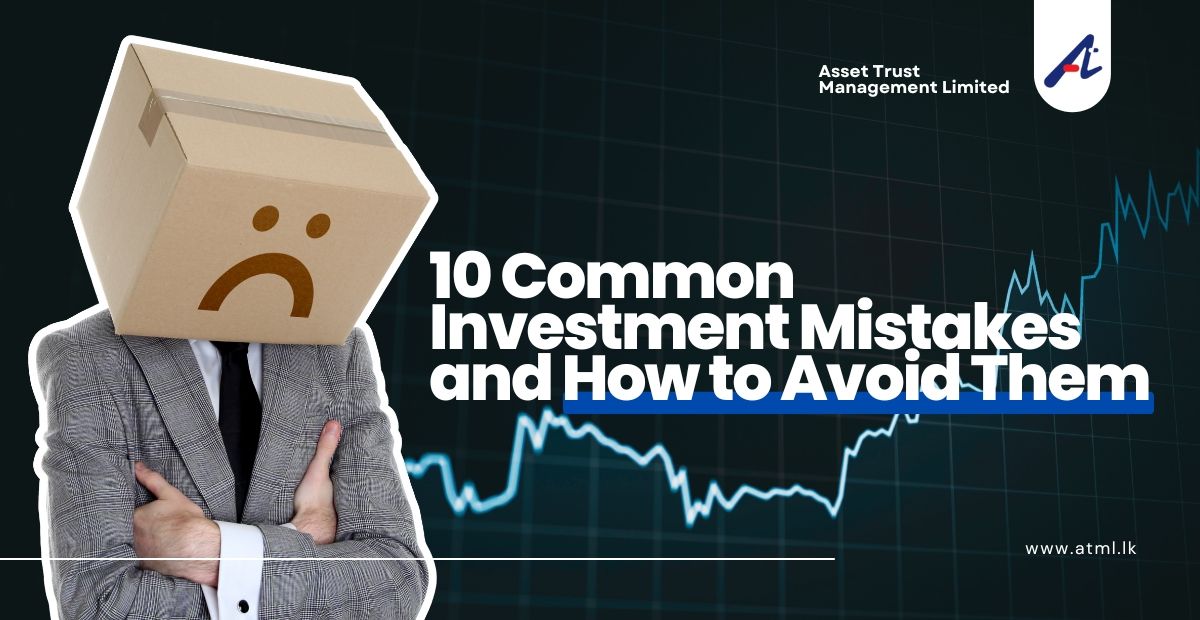10 Common Investment Mistakes and How to Avoid Them

10 Common Investment Mistakes and How to Avoid Them
Posted on 2025-01-16 10:22:48
Investing can be a great way to grow your wealth, but it's easy to make mistakes along the way. Here are 10 common investment mistakes and tips on how to avoid them:
1. Chasing After Hot Stocks or Trends
- Mistake: Jumping into investments based on hype, news stories, or trends, often leading to buying at peak prices.
- How to Avoid It: Stick to a long-term investment strategy based on your financial goals and risk tolerance. Do thorough research and avoid reacting to short-term trends or emotional impulses. Make investment decisions based on fundamentals, not excitement.
2. Lack of Diversification
- Mistake: Investing too much in one asset, sector, or stock, which increases the risk of significant losses if that investment underperforms.
- How to Avoid It: Diversify your portfolio across various asset classes (stocks, GSec, real estate, Money Markets etc.), sectors, and geographic regions. This reduces the risk of one underperforming asset affecting your entire portfolio.
3. Trying to Time the Market
- Mistake: Trying to predict market movements and make decisions based on short-term fluctuations, which is difficult to do accurately and consistently.
- How to Avoid It: Focus on a long-term investment strategy and avoid frequent trading. Consider Rupee-cost averaging (RCA), which involves investing a fixed amount regularly regardless of market conditions, helping smooth out the effects of volatility.
4. Neglecting Risk Tolerance
- Mistake: Taking on more risk than you are comfortable with (or not enough), leading to panic during market downturns or missed growth opportunities.
- How to Avoid It: Assess your risk tolerance before making any investments. Match your investments with your risk profile, time horizon, and financial goals. Review and adjust your portfolio periodically as your life situation changes.
5. Making Emotional Decisions
- Mistake: Allowing emotions like fear, greed, or overconfidence to influence investment decisions, such as panic-selling during market drops or buying into a stock at its peak.
- How to Avoid It: Stay disciplined and stick to your long-term strategy. Avoid reacting to daily market fluctuations. Consider working with a financial advisor or using automated strategies to remove emotional bias from decision-making.
6. Overlooking Fees and Expenses
- Mistake: Ignoring the impact of fees on investment returns, such as management fees, trading commissions, and other hidden costs, which can erode long-term performance.
- How to Avoid It: Be mindful of the fees associated with any investment vehicle. Look for low-cost options like index funds or Mutual Funds. Over time, even small differences in fees can significantly impact your returns.
7. Focusing Too Much on Past Performance
- Mistake: Choosing investments based solely on past performance, assuming they will continue to perform well in the future.
- How to Avoid It: Past performance is not indicative of future results. Look at a range of factors when selecting investments, such as the underlying fundamentals, risk, and potential for future growth. Do not rely solely on historical returns.
8. Neglecting to Rebalance
- Mistake: Failing to rebalance your portfolio periodically, which may lead to unintended exposure to certain asset classes as market conditions change.
- How to Avoid It: Regularly review and adjust your portfolio to maintain your desired asset allocation. Rebalancing ensures that you are staying aligned with your long-term goals and risk tolerance.
9. Underestimating the Importance of Emergency Savings
- Mistake: Investing money that should be reserved for emergencies or short-term needs, which can lead to having to sell investments at a loss in case of urgent cash needs.
- How to Avoid It: Build an emergency fund with enough cash to cover 3-6 months of living expenses before you invest. This ensures that you don't need to liquidate investments at inopportune times.
10. Not Having a Clear Investment Plan
- Mistake: Investing without a clear, defined strategy, leading to impulsive decisions or mismatched investments.
- How to Avoid It: Set clear financial goals, determine your risk tolerance, and build a well-thought-out investment plan. Consider working with a financial advisor to create a strategy tailored to your needs, and regularly review and adjust your plan as circumstances change.
Avoiding these common investment mistakes can significantly improve your chances of success in building wealth over time. By focusing on diversification, maintaining a disciplined approach, understanding your risk tolerance, and avoiding emotional decisions, you can better navigate the complexities of investing and stay on track with your financial goals.
